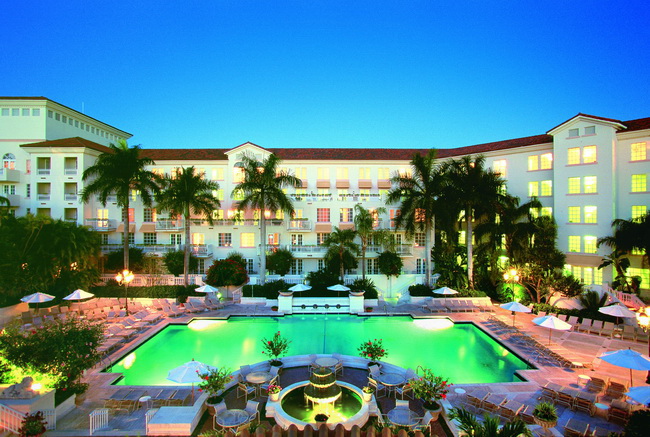Two owners terminate long-term hotel management agreements, seize control of their hotels from branded operators, and then settle their litigation
8 July 2012
Hotel Lawyer with an interesting comparison of two significant hotel takeovers — Marriott Edition Waikiki becomes The Modern Honolulu and Fairmont Turnberry Isle & Resort drops Fairmont
Two significant hotel takeovers that started at virtually the same moment last August both settled last week. One is the widely-publicized takeover of the Edition Waikiki in Honolulu and the other is a little-publicized takeover of the Turnberry Isle Resort & Spa in the Miami where the owner terminated a “no-cut” hotel management contract with more than 50 years left to run and expelled Fairmont from the property.
JMBM’s Global Hospitality Group®, together with local counsel Dennis Richard of Richard and Richard, P.A., represented the owner of the Turnberry Isle Resort & Spa in a major victory over Fairmont Hotels & Resorts, in Miami, Florida, by preventing Fairmont from re-taking the hotel. For reasons discussed below, that result is noteworthy when compared to the result in the case between Marriott and the owners of the Edition Waikiki in Honolulu, Hawaii.
The comparison between the Fairmont case and the Edition Waikiki case is particularly interesting, given that two unrelated hotel owners seized control of their hotels from their operators at virtually the same moment on Sunday morning, August 28, 2011.
 Turnberry Isle Hotel & Resort, Aventura, Florida. JMBM’s Global Hospitality Group® represented the owner of this iconic resort — in designing and executing a successful strategy to terminate Fairmont’s management contract and to oust Fairmont from the property. The Federal Court’s decision upheld our interpretation of the applicable legal principles, superseding various express contractual terms. Fairmont’s suit to regain control of the hotel was soundly defeated on all grounds.
Turnberry Isle Hotel & Resort, Aventura, Florida. JMBM’s Global Hospitality Group® represented the owner of this iconic resort — in designing and executing a successful strategy to terminate Fairmont’s management contract and to oust Fairmont from the property. The Federal Court’s decision upheld our interpretation of the applicable legal principles, superseding various express contractual terms. Fairmont’s suit to regain control of the hotel was soundly defeated on all grounds.The owner’s takeover was validated in the Fairmont case, while the owner’s takeover in the Edition Waikiki case was not. Independently commenced at the same time, both cases have now independently settled — within a week of each other by the end of the first week of July 2012. In both cases the owners terminated long-term, “no-cut” hotel management agreements with major hotel brands.
Important legal decision issued on terminating hotel management agreements
Last October, a Miami Federal District Court dashed Fairmont Hotel’s hopes of regaining management control over the Turnberry Isle Resort & Spa, in Aventura, Florida (near Miami). The Court’s order denied Fairmont’s request for a preliminary injunction to be reinstated as the operator of the hotel. Fairmont’s management agreement would have allowed it to operate the hotel for up to 50 years.
Turnberry v. Fairmont decision is likely to become a frequently cited case
We believe that this 71-page opinion written by Magistrate Judge Goodman and adopted and reaffirmed by Judge Donald L. Graham is destined to become one of the most cited cases in the area of hotel management agreements. Although infallibly grounded on legal precedent — going back hundreds of years in English common law, a landmark U.S. Supreme Court case by Chief Justice John Marshall, and a well-known line of hotel cases — this is one of the best-written, most thoroughly researched and comprehensive decisions in the area.
The Fairmont court had a clear grasp on extremely complex and difficult legal issues. Both federal judges in the case — Judge Graham and Judge Goodman — independently came to the same conclusion: Turnberry had the power to terminate the some 50 year agreement, despite its express provisions to the contrary.
Factual background of the Fairmont case
The Turnberry-Fairmont relationship at Turnberry Isle Resort failed, but they were stuck in a purportedly 50-year contract. That was when Turnberry came to JMBM’s hotel lawyers to help evaluate options, devise a plan, and execute it. The plan worked.
Paraphrasing the Fairmont opinion: In the early morning of Sunday, August 28, 2011, Turnberry engaged in a bold, surprise takeover ousting Fairmont as the operator of the resort and terminating the management agreement without any advance notice. Turnberry demanded that senior hotel management immediately appear at the hotel on short notice on that Sunday morning, informed them once they arrived that Turnberry was de-branding the hotel and resort, and directed them to immediately leave the hotel property under the escort of an outside security team. Turnberry then changed the branding of the hotel, from napkins to marquees, retained employees loyal to Turnberry, switched to a different room reservation system and website, and removed all references to the Fairmont name.
 The former Edition Waikiki now operates without Marriott as The Modern Honolulu. On July 6, 2012, settlement with Marriott was publicly announced. Unbeknownst to each other and separated by 6,000 miles and a 6 hour time difference, the owners of the Edition Waikiki and the Turnberry Isle Resort both took control of their hotels at virtually the same moment on Sunday morning, August 28, 2011 — 2 am Honolulu time which is 8:00 am Miami time.
The former Edition Waikiki now operates without Marriott as The Modern Honolulu. On July 6, 2012, settlement with Marriott was publicly announced. Unbeknownst to each other and separated by 6,000 miles and a 6 hour time difference, the owners of the Edition Waikiki and the Turnberry Isle Resort both took control of their hotels at virtually the same moment on Sunday morning, August 28, 2011 — 2 am Honolulu time which is 8:00 am Miami time.Two days after the takeover, Fairmont sought emergency relief in federal court to get back into the hotel. The Court summarily denied Fairmont’s request. Fairmont followed that with a request for a preliminary injunction seeking the same relief. After a trial on the matter, complete with testimony from top executives of Fairmont and the hotel owner, as well as industry experts, Magistrate Judge Jonathan Goodman, issued his Report and Recommendation that Fairmont’s motion be denied.
Then Judge Donald L. Graham, having himself conducted an independent review of the record, found that Fairmont failed to meet its burden of persuasion on each of the four requirements for a preliminary injunction.
On October 14, 2011, Judge Graham issued his decision which “AFFIRMED, ADOPTED AND RATIFIED” Magistrate Judge Goodman’s Report and Recommendation. As a result, Turnberry maintained control of the operations of the hotel and Fairmont was not reinstated.
Some interesting comparisons of Turnberry v. Fairmont and Edition Waikiki v. Marriott
The victory for Turnberry in the Fairmont case is particularly noteworthy when compared to the highly publicized litigation involving Marriott and the Edition Waikiki Hotel.
- Both long-term, no-cut hotel management agreements are governed by New York law.
- Unbeknownst to each other, both takeovers occurred on Sunday morning, August 28, 2011. While Turnberry took control of its hotel at 8:00 am Miami time, some 6,000 miles away, the owner of the Edition Waikiki seized control of its hotel “in the middle of the night” at 2 am Honolulu time. Given the six hour time difference, the takeovers occurred at virtually the same moment!
- In contrast to Turnberry’s successful takeover from Fairmont, however, the owner of the Edition Waikiki was ordered, within days of the takeover, to return the control to Marriott.
- To forestall Marriott retaking control of the hotel, the Edition Waikiki owner then filed bankruptcy in January 2012. Last week (the first week of July 2012), Marriott agreed to settle the case. The amount of the payment was not disclosed; however, the bankruptcy court judge had ruled in early June that a reasonable estimate of how much Marriott should be paid for lost management fees and expenses was $20.7 million. Marriott had sought $72 million for what it contended was an unjust breaking of a 30-year management contract. With the settlement announced on July 6, 2012, Marriott has withdrawn its competing plan in the bankruptcy and its objection to M Waikiki’s plan. Marriott also has agreed to drop the New York litigation.
- Turnberry moved on from Fairmont, without a bankruptcy, and on June 28, 2012, the Court dismissed Fairmont’s pending lawsuit for damages based upon a confidential settlement reached by the parties.
Court order and opinion in Fairmont v. Turnberry
There are many important parts to this opinion, but one major theme is summed up in this statement by the Court:
“The notion of requiring a property owner to be forcibly partnered with an operator it does not want to manage its property is inherently problematic and provides support for the general rule that a principal usually has the unrestricted power to revoke an agency.”
The Court’s full decision can be downloaded by clicking Fairmont v. Turnberry.
JMBM’s Global Hospitality Group®, together with local counsel Dennis Richard of Richard and Richard, P.A., represented the owner of the Turnberry Isle Resort & Spa.
Do you need help with a hotel management agreement?
The hotel lawyers of JMBM’s Global Hospitality Group® have negotiated, re-negotiated, litigated, arbitrated and advised on more than 1,000 hotel management and franchise agreements. We have current state-of-the-art experience in dealing with every major branded hotel operator, most of the independent managers, and all the significant franchisors.
Our business and legal experience from all these deals provides the largest virtual database of hotel management and franchise agreement terms in the world. JMBM can help you confidently establish reasonable “market” terms for your deal. With our HMA PRO™ process, we can help you recruit the right brand and get a management agreement you can live with.
It is always best to start out with the right brand and operator for your hotel … and an agreement with fair terms you can live with. But when you don’t have that advantage and the situation becomes unbearable, what can you do as an owner to renegotiate or terminate a long-term, “no-cut” management agreement?
We have developed some very effective tools for dealing with long-term hotel management agreement problems. Clients really value our more than 20 years of business and legal experience to help them evaluate the situation, identify alternatives, develop successful strategies and execute them.
The right outcome can unlock millions of dollars of value.
Articles about terminating hotel management agreements
More on M Waikiki Edition lawsuit against Marriott – What Marriott’s General Counsel says
M Waikiki’s Edition lawsuit against Marriott and Ian Schrager – an owner’s HMA dispute with Marriott
Terminating hotel operators: Turnberry Resort drops Fairmont flag
Hotel management agreement terminations — Is there a better way?
Terminating hotel management agreements when things don’t work? Not easy, but not impossible either.
Ritz-Carlton Bali hotel management agreement termination further court order
How to terminate a hotel management agreement when an operator really deserves it!
This is Jim Butler, author of www.HotelLawBlog.com and hotel lawyer, signing off. We’ve done more than $87 billion of hotel transactions and have developed innovative solutions to unlock value from hotels. Who’s your hotel lawyer?
Our Perspective. We represent hotel lenders, owners and investors. We have helped our clients find business and legal solutions for more than $125 billion of hotel transactions, involving more than 4,700 properties all over the world. For more information, please contact Jim Butler at jbutler@jmbm.com or +1 (310) 201-3526.
Jim Butler is a founding partner of JMBM, and Chairman of its Global Hospitality Group® and Chinese Investment Group®. Jim is one of the top hospitality attorneys in the world. GOOGLE “hotel lawyer” and you will see why.
Jim and his team are more than “just” great hotel lawyers. They are also hospitality consultants and business advisors. They are deal makers. They can help find the right operator or capital provider. They know who to call and how to reach them.



